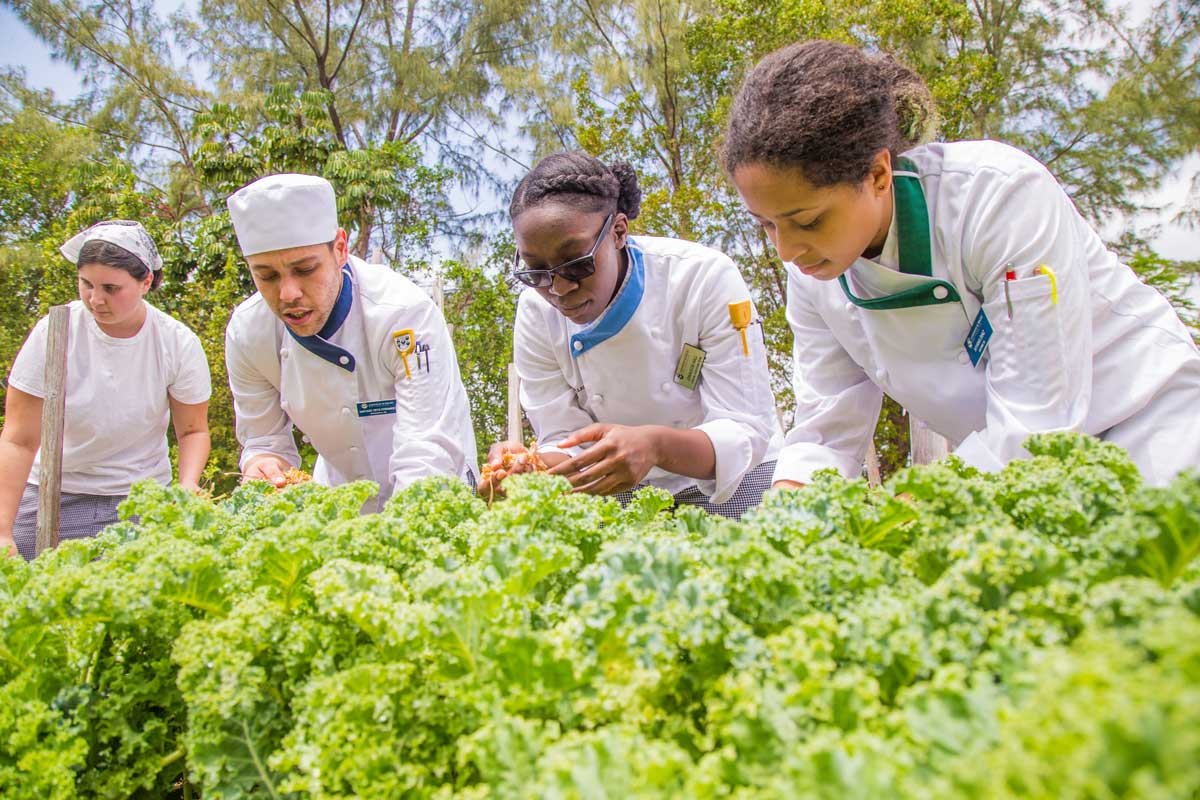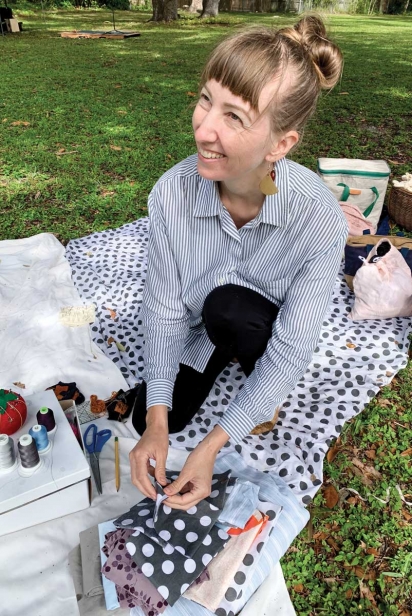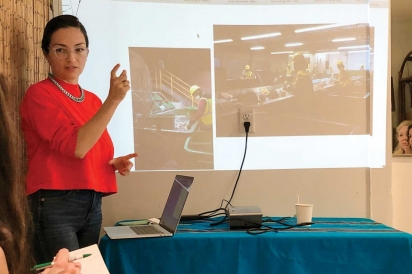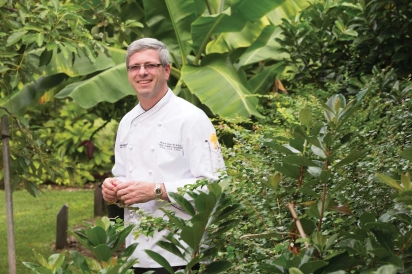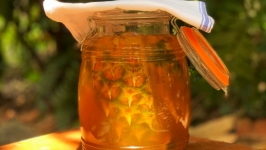Profiles in Sustainability
Promoting Ocean Friendly Restaurants
Jayson Koch, vice chair at Surfrider Foundation
No plastic straws? Check. No plastic takeout bags? Check. Reusable tableware for dining? Check. For a restaurant to be designated ocean friendly, it must comply with a list of criteria. Hundreds of restaurants across the country – including a South Florida school cafeteria – have measured up to the Surfrider Foundation’s program.
“We have over 650 Ocean Friendly Restaurants around the United States,” says Jayson Koch of the group’s Miami chapter. In South Florida, nearly a dozen restaurants, and the school cafeteria at Palmer Trinity School in Palmetto Bay, are participating in the program.
A member of the Surfrider Foundation since 2010, Koch began taking on more leadership roles with the organization in 2012, including monitoring and managing the Ocean Friendly Restaurant program. “My goal is to sign on other private schools throughout Miami-Dade County. Eventually, I hope to have every private school in Miami-Dade on the Ocean Friendly list,” he said.
Always looking to collaborate with like-minded groups, Koch is now in talks with the Coconut Grove Chamber of Commerce to convert the Coconut Grove Arts Festival “into a solid, sustainable show.”
The organization has been involved in all the recent plastic straw ordinances now in place. “We started working with community leaders on all their initiatives and creating sustainable communities,” he says. “Luckily, now it’s common knowledge to bring an insulated cup and reusable bags to the grocery store.”
Koch says it’s easy to find Ocean Friendly Restaurants on their website or downloadable app. “If you’re looking to patronize restaurants not only for their food, but sustainability efforts, this list of restaurants is perfect.”
What Makes an Ocean-Friendly Restaurant?
To qualify, restaurants must follow a set of criteria established by Surfrider, including:
• Use no polystyrene (Styrofoam)
• Follow proper recycling practices
• Use no plastic bags for take-out or delivery orders
• Provide reusable tableware for eat-in dining
• Paper straws provided only upon request
Building Community Support for Sustainable Living
Carrie Sieh, founder of Zero Waste Miami
When artist Carrie Sieh, a permaculture enthusiast and social justice advocate, moved to South Florida in 2007, she quickly noticed Miamians “were more into shiny things, and it was a bit discouraging.” Drawing inspiration from her father, an earth scientist in California whose job was to dig through the sediment to see what caused earthquakes, Sieh eventually discovered people and organizations aligned with her goals – and created Zero Waste Miami.
Her website helps individuals, organizations and companies find local resources and acquire skills in waste reduction and circular economy, particularly relating to social justice, climate change and degrowth.
One of the main goals of Zero Waste Miami is showing people how to intentionally scale back and slow down. Municipalities and citizens should meaningfully engage with that idea, she believes. Addressing the affordable housing crisis is crucial if “we’re going to make the environmental adjustments we need to make,” she adds. “It’s vastly more difficult for someone whose main goal is to make ends to meet to take steps of sustainability. But those who contribute the least to this issue are the ones who suffer the most from it,” she says.
In practical terms, making a difference in the present may mean reviving skills from the past. Some resources listed on Zero Waste Miami include workshops on decorative mending to give new life to torn or stained clothing, and swap meets where people can trade goods they don’t need, keeping items out of the landfill. It’s all meant to build community support for sustainable living.
“Continued, endless, nonstop growth is not sustainable,” she says.
Zero Waste Miami
• Community workshops on wide-ranging topics, like natural ink making, egg dyeing and apartment gardening
• Where to buy household items in bulk, canning and preserving, farms, local herbal sources, beekeepers and edible garden services and supplies
• Where to repair and restore shoes, clothing and furniture
• Composting, beekeeping, pest management and rain barrel information
• Incentives and rebates for solar panels, irrigation and efficient showerhead and toilet exchange
The Voice of Sensible Sustainability
Lina Castañeda, Minima Lina
Lina Castañeda was deep into the world of sustainability in 2016 when she launched her blog MinimaLina, which has now expanded into a podcast, online shop and events.
The mother of two, who calls herself “an activist at heart,” has been training hard on the road to helping the community learn about living more sustainably and understanding plastic pollution.
In 2017, she took part in Catalyst Miami’s 12-week Climate Resilience Program. In 2019, she got involved with Surfrider Foundation and is now their Rise Above Plastics Coordinator, leading their program to eliminate plastic in the ocean and marine environments, and working on creating policy against plastic pollution. She’s also on the advisory board of Conscious Urbanism, a group that advocates for sustainable urban development, and teaches courses on urban gardening, sustainable economy, climate resiliency and urban planning. She’s also received speakers network certification from the CLEO Institute in Miami.
“In January 2020 I began my podcast, which is just an extension of the efforts on my website,” Castañeda says. Here, she discusses local recycling, practices for reducing waste and alternative options. One topic she covers in detail is smart recycling, including bioplastics, alternatives to single-use plastics and proper handling of plastics, a topic she’s brought to Mima Market in Miami Shores.
“I feel it’s my civic duty to inform my community about diligent sustainability,” she says.
Learn from MinimaLina
Castaneda’s site and podcast are packed with practical tips to live more sustainably:
• Making sense of bioplastics, which she says are “as terrible for the environment as regular plastic.” Instead, she recommends carrying your own mason jars, mugs and reusable cups.
• Where to buy spices, grains, tea and other foods in bulk
• Good substitutes for plastic wrap and bags, like reusable beeswax paper, glass containers, brown paper bags
Training Leaders in Sustainable Systems and Food Justice
Bruce Ozga, dean of Culinary Education at Johnson & Wales University
Johnson & Wales University’s Miami campus is well known for its alumni, like chefs Michelle Bernstein, Adrianne Calvo and Timon Balloo. Come fall, the school will also be training future leaders in sustainable food systems and practices.
Seeing a shift in the hospitality industry, the culinary program at Johnson & Wales University was recently renamed the College of Food Innovation & Technology to better fit with its reimagined degree programs, says Bruce Ozga.
“We’re looking at it from growing on the farm and connecting the farm and the kitchen. Our new Culinary Nutrition Degree connects the chef and nutritionist because we want to create more healthy-minded chefs,” he says. “We’re also delving more into recipe, menu and product development. The change will happen at all four campuses in Fall 2020.”
They’re also introducing a degree in food and beverage entrepreneurship. “The trend is more interdisciplinary, bringing in areas like agriculture, wellness, science, athletic performance, business entrepreneurship. It spans the cycle of food across the board,” he says.
The edible landscape on campus figures into their studies. “For us here in South Florida, we’re able to grow all year round. We have over 100 species of plants and trees on campus. So, what you need, you go get it,” Ozga says. There’s citrus, mango, avocado, lemongrass, guava, canistel, bay leaves, annatto, Medjool date palms, tamarind and coconut palms.
They’re also growing cacao, a great resource for pastry students, he says. “With the cacao pods, our pastry students learn the process of making chocolate.” he said. “We’ve also got raised beds and are doing some gardening.” Students visit local farms, make farm-to-table connections and learn about the challenges farmers face. They also visit the Fontainebleau, which has its own fleet of boats for fishermen to bring in fresh seafood daily.
All About Sustainable Food Studies at Johnson & Wales
Students can get a bachelor’s degree in Sustainable Food Systems, designed for students who want to transform industrial food systems into the more resilient, dynamic networks for local and global communities, economies and environments. Courses include:
• Cooking from the Farmstand, exploring the farm to table movement and connection between public health and the local food system
• Growing for the Menu, looking at agricultural approaches to food production and fostering an environmentally sustainable land ethic
• Sustainability in the Culinary Kitchen, providing hands-on experiences with local food producers and artisans
• Health and The Harvest, exploring the correlation between health, wellness and the local food system
• Cooking for Resilient Foodways looking at local and global foodscapes, food choice and advocacy and social justice through cooking


